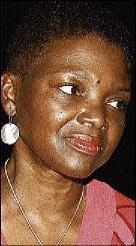'Commonwealth still vital to the region'
Published: Thursday | August 13, 2009

Baroness Amos
Former foreign aid minister and leader of Britain's House of Lords, Baroness Amos, believes the Commonwealth still has a crucial role to play in the global arena, but says the organisation is in need of leadership in member countries.
Amos, who was in Jamaica last week on a working visit, was responding to questions on the perception of the Commonwealth in the Caribbean, especially in Jamaica where a recent poll by a local research group (Hope Enterprises Ltd) found that many Jamaicans were not only ignorant of the association but also viewed it as irrelevant to national life.
Only 20 per cent of Jamaicans sur-veyed believed the Common-wealth to be of value to Jamaica.
The Commonwealth is an inter-governmental organisation of 53 independent member states, most of them formerly part of the British Empire.
"I think that's disappointing but I think that, in a way, it's an opportunity for the Commonwealth Secretariat to use this to build that awareness again and demonstrate that it has a role," Amos said.
Last Thursday, Jamaica celebrated its 47th year of independence from British rule, but still maintains significant links with the United Kingdom.
Amos believes that this relation-ship should be strengthened.
Last week, she was part of asix-member UK Commonwealth Parliamentary Association delegation to the island with a view to creating stronger bonds with the Jamaican Government.
While dodgy with details of the commitments made - if any - Amos said the mission had a three-fold aim.
"It was really strengthening the parliamentary links across the Commonwealth, encouraging learning across the Commonwealth, and understanding the challenges and opportunities, and areas that we may give support."
Focus
She said Jamaica's education system had come in for particular focus, questioning "particularly what happens to the young people who don't go on to university".
There were tentative plans, she said, to foster even more networking and exchange programmes with local institutions.
The Guyana-born Labour politician was the first black woman to sit in a British Cabinet, and was last month appointed British high commissioner to Australia.
"I am really looking forward to it," she said of the appointment.
She takes up her posting in October, but said her commitment to regional affairs will not be totally curtailed.
"I am a strong believer in the Commonwealth.
"As high commissioner, I will have a particular role in rep-resenting British interests in Australia ... but I will keep myself informed. But my ability to work directly on those issues will not be the same."
International trade liberalisation
The posting is particularly sensitive as Australia, which is a member of the Commonwealth, has energetically pursued the cause of international trade liberalisation.
A member of the Group of 20 nations, it led the formation of the Cairns Group and the Asia-Pacific Economic Cooperation. Australia is a member of the Organisation for Economic Cooperation and Develop-ment and the World Trade Organisation, and has pursued several major bilateral free trade agreements. It has also been at the forefront of the debate for climate change.
glenda.anderson@gleanerjm.com








